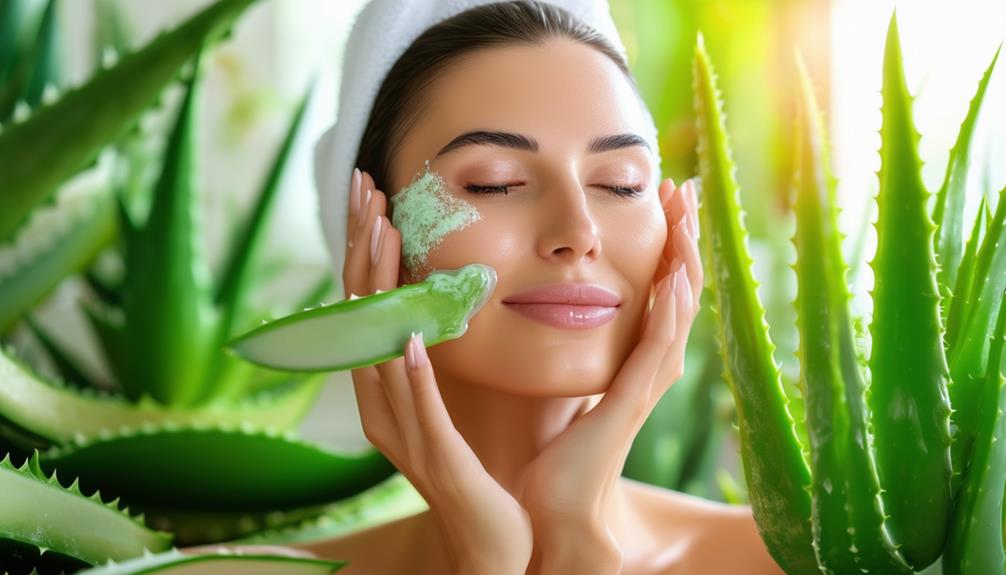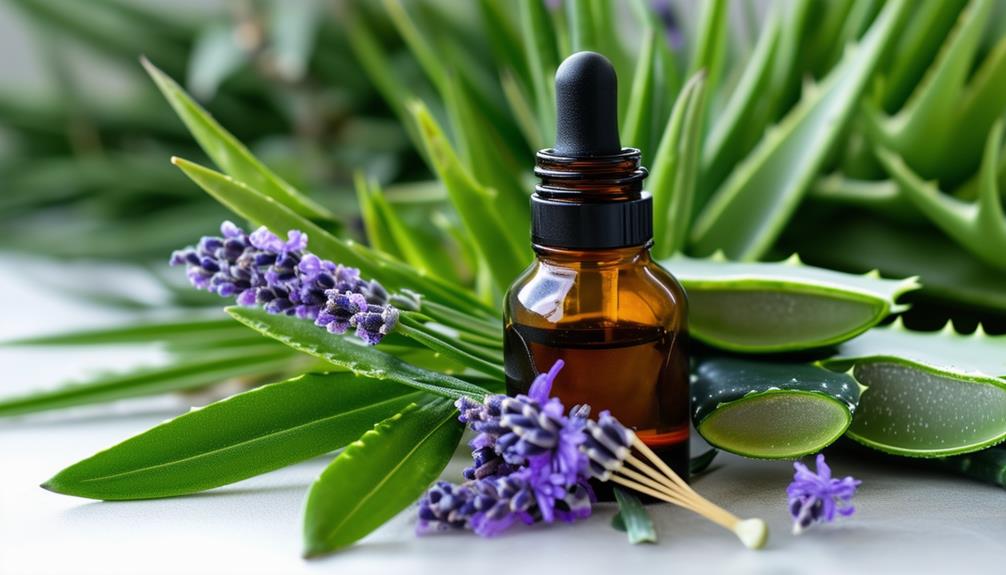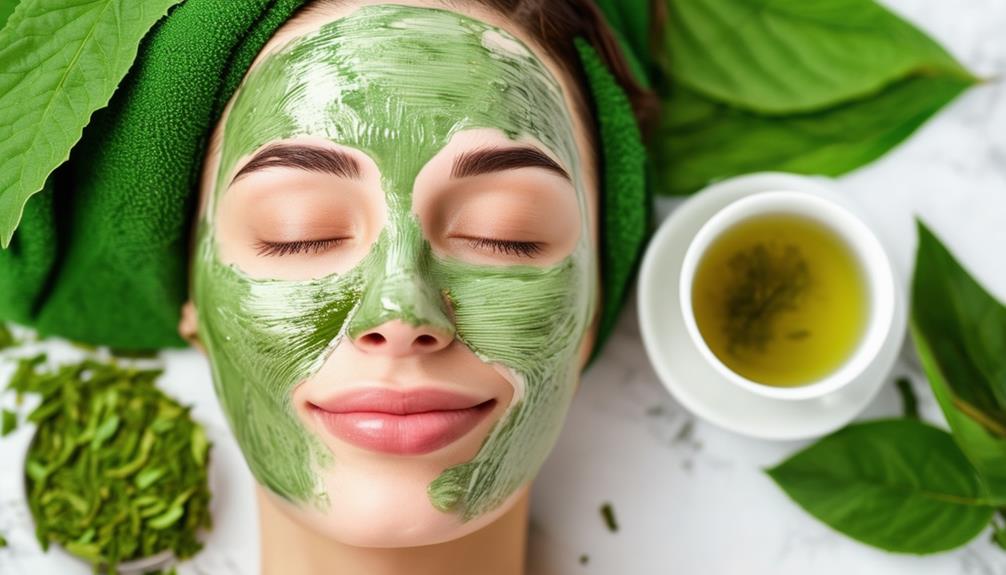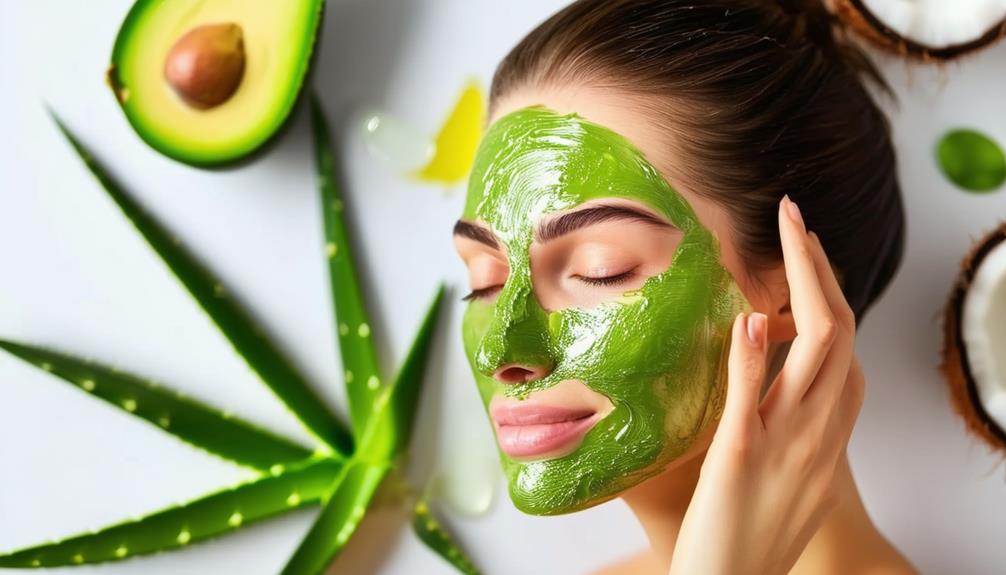Top Natural Remedies for Skin Health
If you've ever stumbled upon aloe vera plants in someone's backyard and wondered about their skincare benefits, you're not alone. These green succulents hold a secret to skin health that is more than just a trendy plant decor. As you explore the world of natural remedies for skin health, you'll find that aloe vera is just the beginning. Stay tuned to uncover a variety of potent ingredients that can transform your skincare routine into a nourishing and rejuvenating experience.
Aloe Vera
Aloe Vera is a well-known plant with soothing and healing properties that can benefit your skin health in various ways. When it comes to skincare routines, incorporating aloe vera can work wonders for your skin.
The benefits of aloe vera gel are abundant, making it a popular ingredient in many skincare products. However, you can also harness its power by creating DIY masks at home.
Aloe vera is renowned for its moisturizing effects, making it ideal for dry or sensitive skin. Its anti-inflammatory properties can help calm irritated skin, reducing redness and promoting healing.
Moreover, aloe vera contains antioxidants that can combat skin aging, keeping your skin looking youthful and vibrant. By including aloe vera in your skincare routine, you can improve overall skin health and address various concerns effectively.
For a refreshing and rejuvenating skincare experience, consider incorporating aloe vera gel into your routine or trying out DIY masks to pamper your skin with natural goodness.
Coconut Oil
Incorporating coconut oil into your skincare routine can offer numerous benefits for your skin health. Not only is coconut oil a versatile ingredient in DIY skincare, but it also provides a range of benefits for your skin. Rich in fatty acids and antioxidants, coconut oil can help moisturize and nourish your skin, leaving it soft and supple. Its antibacterial and anti-inflammatory properties make it suitable for various skin types, including sensitive skin.
In addition to its skincare benefits, coconut oil can also be used in cooking recipes to promote overall health. When consumed in moderation, coconut oil has been linked to numerous health benefits, such as aiding in digestion, boosting immunity, and supporting heart health. Its high smoke point makes it a great option for cooking at higher temperatures, and its subtle flavor can enhance both sweet and savory dishes.
Whether you're looking to improve your skin health or enhance your cooking, coconut oil is a natural and multipurpose ingredient worth incorporating into your daily routine.
Tea Tree Oil
To further enhance your skincare regimen, consider incorporating tea tree oil, a powerful ingredient known for its beneficial properties for skin health. Tea tree oil is renowned for its numerous benefits, making it a versatile addition to your beauty routine. When it comes to acne, tea tree oil's antibacterial and anti-inflammatory properties can help combat breakouts and soothe irritated skin. For those looking to improve hair health, tea tree oil can be a game-changer, promoting a healthy scalp and potentially aiding in the reduction of dandruff.
Here is a table outlining some key uses of tea tree oil:
| Tea Tree Oil Benefits | Tea Tree Oil Skincare Routine |
|---|---|
| – Fights acne | – Dilute with a carrier oil for a soothing face serum |
| – Promotes scalp health | – Add a few drops to your cleanser or moisturizer for added benefits |
| – Helps with dandruff | – Use as a spot treatment for blemishes |
| – Soothes skin irritations | – Incorporate into your face masks for a deep cleanse |
| – Can be used for nail care | – Mix with water for a refreshing toner |
Honey
Consider adding honey to your skincare routine for its natural healing and moisturizing properties. Honey is a versatile ingredient that can benefit your skin in various ways.
One popular way to incorporate honey into your skincare regimen is by using honey masks. These masks can help hydrate your skin, reduce inflammation, and promote a healthy glow.
Honey masks are easy to make at home, making them a great addition to your DIY skincare routines. To create a simple honey mask, mix raw honey with ingredients like yogurt, oats, or turmeric to tailor the mask to your skin's needs.
Apply the mask to clean skin, leave it on for about 15-20 minutes, and then rinse off with warm water.
The antibacterial and antioxidant properties of honey can help fight acne, soothe irritated skin, and provide a natural boost to your skin's overall health. By incorporating honey masks into your skincare routine, you can enjoy the benefits of this natural remedy for glowing, healthy skin.
Green Tea
Green tea offers numerous benefits for skin health due to its rich antioxidant content and anti-inflammatory properties. Including green tea in your skincare routine can work wonders for your skin. The antioxidants in green tea help fight free radicals, reducing signs of aging and promoting overall skin health.
One popular way to incorporate green tea into your skincare routine is by using green tea face masks. These masks can help soothe and rejuvenate your skin, leaving it feeling refreshed and revitalized. The anti-aging properties of green tea can also help diminish the appearance of fine lines and wrinkles, giving your skin a more youthful look.
To make a simple green tea face mask at home, brew a strong cup of green tea, let it cool, and mix it with a bit of honey or yogurt to create a paste. Apply this mixture to your face, leave it on for about 15 minutes, then rinse off with warm water.
Adding green tea to your skincare regimen is a natural and effective way to promote healthy, glowing skin.
Rosehip Oil
With its high content of vitamins and essential fatty acids, rosehip oil is a beneficial natural remedy for enhancing skin health and addressing various skin concerns. Rosehip oil is renowned for its anti-aging properties, helping to reduce the appearance of fine lines and wrinkles while promoting skin elasticity.
Additionally, its hydration boost can nourish and moisturize the skin, leaving it looking radiant and supple.
Moreover, rosehip oil is effective in scar healing, thanks to its ability to improve skin regeneration and texture. The brightening effect of rosehip oil can help fade scars, dark spots, and hyperpigmentation, giving your skin a more even tone and complexion.
Incorporating rosehip oil into your skincare routine can provide your skin with the essential nutrients it needs to thrive and maintain a youthful glow.
Consider adding rosehip oil to your daily skincare regimen to experience its remarkable benefits firsthand.
Witch Hazel
Witch Hazel, known for its astringent properties, is a natural remedy commonly used to address various skin conditions and promote skin health. This botanical extract is derived from the leaves and bark of the Witch Hazel shrub, scientifically known as Hamamelis virginiana.
Here's why incorporating Witch Hazel into your skincare routine can be beneficial:
- Benefits of Witch Hazel
- Reduces Inflammation: Witch Hazel contains tannins that help reduce inflammation and soothe irritated skin.
- Treats Acne: Its natural astringent properties can help control excess oil production and minimize pores, making it an effective remedy for acne-prone skin.
- Soothes Skin Irritations: Witch Hazel can provide relief from conditions like eczema, psoriasis, and insect bites due to its anti-inflammatory effects.
When using Witch Hazel, it's essential to be aware of potential side effects and precautions:
2. Side Effects
– Skin Dryness: Prolonged use of Witch Hazel may lead to dryness, especially for individuals with sensitive skin.
3. Precautions
- Patch Test: Before using Witch Hazel on your face, perform a patch test to ensure you don't have any adverse reactions.
Turmeric
Turmeric, a bright yellow spice commonly used in cooking, also offers a range of benefits for skin health when applied topically. Its anti-inflammatory properties make it a valuable addition to your skincare routine. Turmeric contains curcumin, a compound known for reducing inflammation, which can help with conditions like acne, eczema, and psoriasis.
Including turmeric in face masks can help brighten the skin, reduce redness, and even out skin tone. To make a simple turmeric face mask, mix turmeric powder with yogurt or honey to create a paste, then apply it to your face for 10-15 minutes before rinsing off.
Turmeric not only helps with inflammation but also has antioxidant properties that can protect the skin from environmental damage, keeping it looking youthful and healthy.
Incorporating turmeric into your skincare routine can help you achieve a natural glow and maintain clear, radiant skin.
Jojoba Oil
Jojoba oil, extracted from the seeds of the jojoba plant, is a versatile natural ingredient renowned for its skincare benefits. This liquid wax closely resembles the natural oils our skin produces, making it a fantastic addition to your beauty routine.
Here are some reasons why you should consider incorporating jojoba oil into your skincare regimen:
- Jojoba Oil Benefits:
- Rich in vitamins E and B, as well as essential minerals like zinc and copper, jojoba oil nourishes and protects your skin.
- Its anti-inflammatory properties help soothe irritated skin and reduce redness.
- Jojoba oil's non-comedogenic nature makes it suitable for all skin types, even oily or acne-prone skin.
When it comes to specific concerns like acne or hair care, jojoba oil remains a versatile solution:
2. Jojoba Oil for Acne:
– Balancing sebum production, jojoba oil can help prevent breakouts without clogging pores.
3. Jojoba Oil for Hair:
– Moisturizing and conditioning, jojoba oil hydrates the scalp and helps manage frizz and split ends.
Incorporating jojoba oil into your daily routine can lead to healthier and more radiant skin and hair.
Oatmeal
Oatmeal, a versatile and natural ingredient, offers numerous benefits for skin health when incorporated into your skincare routine. Oatmeal face masks are a popular choice for addressing various skin concerns due to oatmeal's gentle exfoliating properties and ability to soothe irritation.
The antioxidants present in oatmeal can help combat free radicals, promoting a more youthful complexion. Oatmeal also contains anti-inflammatory compounds that can reduce redness and calm sensitive skin, making it ideal for those with conditions like eczema or rosacea.
Additionally, oatmeal bath soaks provide a luxurious way to nourish and pamper your skin. The soothing properties of oatmeal can help alleviate dryness, itchiness, and even minor skin irritations. By adding oatmeal to your bath, you can hydrate your skin and lock in moisture, leaving it feeling soft and rejuvenated.
Whether through face masks or bath soaks, incorporating oatmeal into your skincare routine can help you achieve a healthy and radiant complexion.
Avocado
Rich in nourishing vitamins and minerals, avocado is a versatile fruit that offers numerous benefits for skin health. When it comes to your skin, avocado can work wonders.
Here are three ways you can incorporate avocado into your skincare routine:
- Avocado Face Mask: Create a simple yet effective face mask by mashing ripe avocado and applying it to your skin. The natural oils in avocado can help moisturize and nourish your skin, leaving it soft and supple.
- Avocado Oil Benefits: Avocado oil is rich in fatty acids and vitamins A, D, and E, making it a great addition to your skincare regimen. It can help improve skin elasticity, reduce inflammation, and promote overall skin health.
- Ingesting Avocado: Don't forget that what you put inside your body can also reflect on your skin. Eating avocado regularly can provide your skin with essential nutrients that contribute to a healthy complexion.
Incorporating avocado into your skincare routine can lead to a natural glow and overall improvement in skin health.
Frequently Asked Questions
Can These Remedies Be Used on Sensitive Skin?
If you have sensitive skin, using natural remedies for skin care can be beneficial. Take a holistic approach by choosing gentle ingredients that cater to skin sensitivity. Always conduct a patch test before applying new products.
Are There Any Side Effects When Using These Remedies?
When using natural remedies for skin health, there are potential risks to consider. It's important to take precautions to avoid allergic reactions and irritations. Always perform a patch test and consult with a dermatologist if unsure.
Can These Remedies Help With Acne Scars?
Yes, microneedling treatment and chemical peels can help improve acne scars. These procedures promote collagen production and skin regeneration, reducing the appearance of scars over time. Consult a dermatologist for personalized recommendations and treatment options.
How Often Should These Remedies Be Applied?
For optimal results, apply these remedies twice daily. Consistency is key; however, be mindful of your skin's reaction. Allow time between applications, and always follow proper cleansing and moisturizing routines for best practices.
Can These Remedies Be Used in Combination With Other Skincare Products?
Yes, you can combine natural remedies with your skincare products. Essential oils and natural ingredients can complement your existing skincare routine. Incorporate them wisely into your skincare regimen for enhanced benefits and a healthier skin appearance.
Conclusion
Incorporating natural remedies like aloe vera, coconut oil, and tea tree oil into your skincare routine can help achieve healthy and radiant skin.
For example, Sarah struggled with acne for years until she started using tea tree oil as a spot treatment. Within weeks, her breakouts reduced significantly, and her skin began to clear up.
By incorporating these natural ingredients, you too can experience the benefits of glowing and healthy skin.








